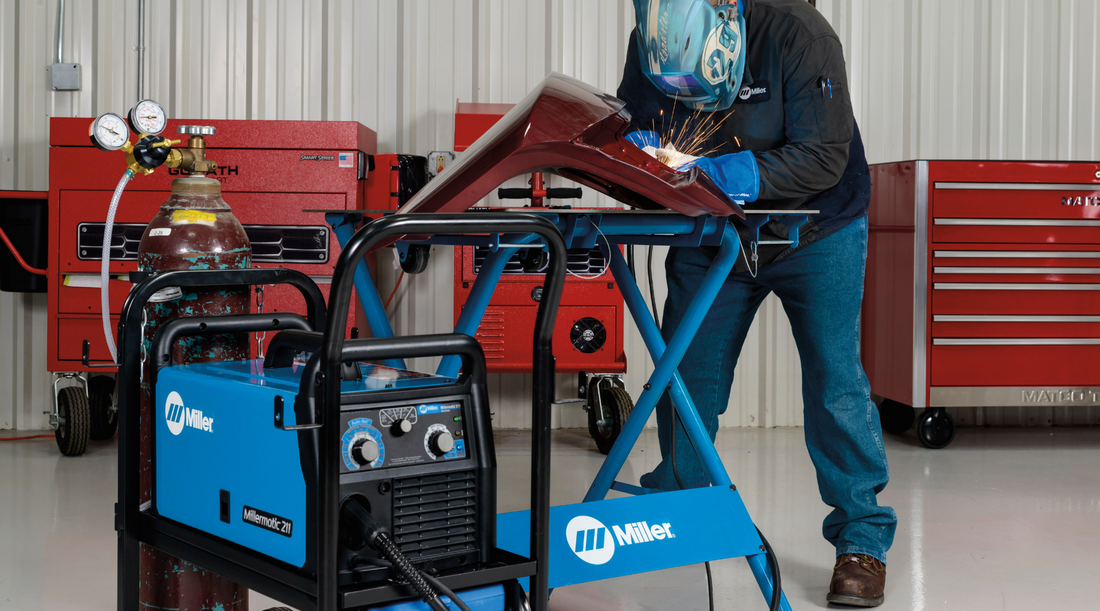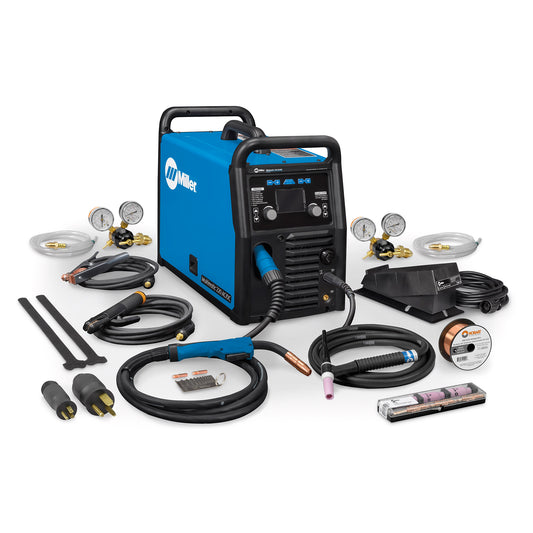If you are just getting started in welding, you know that finding the right machine can be a challenge. The market is flooded with all kinds of options and variations, so it can be very overwhelming. Keep reading below for a guide on what to look for when purchasing your first welder.
Processes
The first step to choosing your new welder is to decide which processes you want to do. There are machines that will do only MIG, TIG, or Stick specifically. So if you are getting into welding and are curious about more than one process, a multiprocess unit would be your best bet. If you are only looking to do a specific process, going with a unit that will do only that process will save you money. Keep in mind many TIG welders will also STICK weld.
Material & Thickness
Having an idea of what you will be welding is really important. If you will be doing thick mild steel on a farm or a welding on an aluminum boat trailer your needs are very different. A big thing to note is DC TIG machines will NOT TIG aluminum. If you are open to MIG aluminum check into a spool gun. Many of the welders have direct connection spool guns that are most cost effective and simple to use.

The actual thickness and type of material will come into play later as you confirm the size and amps you will be needing.
Duty Cycle
An important factor to look for when buying your welder is the duty cycle and maximum power. The duty cycle is the measurement of time that a machine will weld at a set amperage before failing. For example, if a duty cycle says 20% at 200 amps, that means it would weld for 2 minutes straight within a 10 minute time frame at that amperage before overheating.
The power or maximum amperage of your machine is also important for a few reasons. It will determine the thickness of the material that you will be able to weld, as well as the penetration of the weld. If you are looking at a machine, most specification sheets will tell you the maximum weld thickness for the unit. On the other end, you want to make sure that you can turn the amperage down on your machine for thinner materials. If you are welding thin materials, you will need to be able to lower your amperage to prevent burn through.
Where are you welding?
Final check is if you have only 110 power available or 220. Many smaller welders offer dual voltage. This means they include an adapter for 220 to get you more power if you have that available. Note a 220 power machine will need at a minimum 20 amp breaker.
Advantage of a dual voltage machine is if you need to use the machine out of your shop it gives you a lot more flexibility.

Adaptability / Future Growth
Obviously, you want your machine to cover all of your needs starting out. However; you should also consider your needs for the future as you grow as a welder. Say you were starting welding out by just doing MIG but would like to do TIG at some point, it would be cost effective to get a machine that can do both right out of the gate. This logic also applies to the power of your machine. If you think you might run into thicker materials down the road, it'll save you money by having a machine that is already capable.
Or if you want to learn to TIG getting a multiprocess with DC TIG capability in the future will allow you to dabble into TIG when you are ready.
Warranty / Replacement Parts
The availability of replacement parts and the extent of the manufacturer warranty is also very important things to look out for. The majority of manufacturers have readily available replacement parts, but some of them are better than others.
If you do some research you will find the major players are Miller Electric, Lincoln Electric, ESAB and Hobart. We carry all of the lines and can speak to the quality and warranty. Most of the above brands have equipment ranging from entry level to production welding.
The warranty and amount of service centers in your area is another thing to consider. Most manufacturer warranties cover parts and labor for 2-3 years, you just need to take it to a service center. That is why it is best to check if one is in your area before buying.
Portability / Shop Space
The final thing to consider when looking at a new machine is the portability and the size of the machine. You don't want to be stuck lugging a bulky machine around, so look for inverter options that are light enough to move. Big advantage to newer technology welders is they are lighter and more durable than ever before. If you have more questions on selecting a machine reach out to our support team!
Are you the market for an entry level machine? Check our other blog post: "The Two Best Entry Level Welders for Each Welding Process"
Or if you want a do it all machine check out our comparison Miller Mulitmatic 220 vs ESAB Rebel 205.


